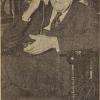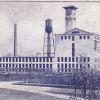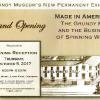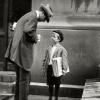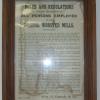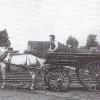Spinning Tales
by Cate Murway
Mark your calendar for the extra special Grand Opening Reception of the “Made in America: The Grundy Mill and the Business of Spinning Wool” permanent exhibit. You are cordially invited to attend on Thursday, October 5, 2017 from 6:00PM- 8:00Pm at the Margaret R. Grundy Memorial Library meeting room. This is the FREE final event in honor of the Grundy Museum’s Golden Anniversary [1967-2017].
A grant from the Bucks County Visitor Center has been secured to fund this exhibit.
No registration necessary.
The focus of this “Made in America” exhibit will be the impact of the Grundy family and the mill on the local community. The historical context of industrial America will be presented on museum interpretative panels as one can view the Mill not only from the industrialist’s perspective and the worsted process, as the information will focus on mill operations and the daily life of its workers and their families.
Donna Moore McCloskey, the Grundy Museum site administrator, encourages community residents to go out and take photos of the mill and clock tower.
The Margaret R. Grundy Museum staff is avidly seeking community participation.
For the third year running, the Grundy Museum was voted "Best in Bucks County".
Start collecting your treasured photographs of the Grundy Mill and the clock tower as the goal is to present a community collage, an assemblage of pictures throughout the years.
Post exhibit, oral histories and experiences of workers and/or their families will be collected, so please gather any stories of family members who worked in the Mill. Both direct and indirect memories help extend the threads of generational moments to later generations.
Extra! Extra! Record-breaking news on September 14, 1876!
Grundy Brothers and Richard Campion will be manufacturing their goods in Bristol instead of Philadelphia. The New Woolen Mill for the manufacture of worsted yarns, the “Bristol Worsted Mill”, will be built.
The initial telephone switchboard in the county was installed at 232 Mill Street in 1883 and the Grundy Mill had one of the first phones.
In the last quarter of the nineteenth century, the Bristol Improvement Company was chartered to attract more industries to the town. For a period of nineteen years Joshua Peirce was the leading spirit in the industrial development of the Borough. Between 1876 and 1898, as the Bristol Improvement Company’s founder and director, Mr. Pierce constructed the 1st industrial buildings and was instrumental in the transformation of Bristol from a canal-oriented town to a manufacturing center with the Bristol Worsted Mill, Keystone Fringe Mill, Star Woolen Mill, engaged in the manufacture of knit goods, Wilson and Fenimore Wall Paper Mill and the Thomas L. Leedom & Co. Bristol Carpet Mill. The Keystone Mill, which started as a fringe manufacturing plant operated by L. M. Harned & Co., became a warehouse for the Grundy Mill in 1885. The Star Mill passed through the hands of three owners before being annexed to the adjacent wallpaper mill in 1891.
Of these, the worsted mill, first leased to Grundy Brothers and Campion and later owned solely by Joseph G. Grundy advanced the Bristol textile industry, which started in 1815 with a woolen mill, to be the most dominant industry of the area. Today, the clock tower at the Grundy Mill still a local landmark, has kept historic Bristol on the Delaware on time for over a century!
In less than 50 years of Pierce’s first activities, the industrial center of Bristol was economically strong and viable.
September 28, 1882 *The Bucks County Gazette from Bristol, Pennsylvania
The manufactures of Bristol at present give employment to more than a thousand people, distributing in wages about $400,000 per year. Its effect upon the town may be appreciated from the fact that the census of 1870 showed a population of 3,270 while that of 1880 shows 5,300, an increase of fifty-eight percent.
When Pierce found himself in financial difficulty, the chief burgess [representative], William Hulme Grundy [1836-1893], who filled that office in the town for two years, assisted him.
March 1, 1928 *The Bristol Daily Courier from Bristol, Pennsylvania
The Burgess and members of Town Council worked hand in hand with these representatives of our industrial activities and it can be said with certainty that this great Industrial development would not have been possible without the splendid spirit of co-operation shown by our local government and the encouragement and support by them given to those who were backing the movement for the town's industrial growth.
William, who was born in Philadelphia, was the second child of Edmund [1799-1878] and Rebecca (Hulme) Grundy [1804-1895], the daughter of William and Rachel [Knight] Hulme. His maternal ancestors were among the earliest English settlers in Bucks County. Giles Knight came across the Atlantic Ocean with William Penn in the very small, over-crowded wooden ship "Welcome” on his first visit to his new province, choosing to face hardships and exhibiting the faith and spirit that embodied the birth of their new home, Pennsylvania. The Hulmes were the originators of the Farmers Bank of Bucks County, which had its inception in Hulmeville before being relocated to Bristol.
Edmund Grundy, a native of England, came to this country as a young man, not long after the Revolution. Locating in Philadelphia, he became a noted and prosperous merchant.
William was educated at a select school in Philadelphia and at an early age became a clerk in a mercantile establishment, later entering into the mercantile trade for himself.
In 1877, he began the manufacturer of worsted yarns and moved his plant to Bristol in Bucks County.
In 1876, he established the Bristol Worsted Mills that was so long and successfully conducted by the firm of William H. Grundy & Co., of which he was the senior member. William was one of the first members of the Union League in Philadelphia and a prominent member of the Manufacturers Club. He was a public-spirited and broad minded business man and did much to advance the interests of Bristol.
William Hulme and Mary L. [Ridgway] Grundy were the parents of two children, Joseph Ridgway and Margaret Ridgway Grundy.
Upon his sudden death from apoplexy and heart disease on October 26, 1893, his son, who was born in Camden, NJ in 1863, obtained partner ownership and continued his father’s and Pierce’s tradition of industrial expansion.
Born into this Quaker family and educated at Swarthmore College, Senator Joe Grundy too was public spirited and civic minded and he succeeded in establishing and maintaining a business by sheer force of character, by his boldness, his self-faith and decidedly 100% commitment. The Grundy Mill’s Complex was by far the county’s largest single employer, dramatically impacting the workforce, the pinnacle of in-town growth.
Make your personal, impactful memories and pictures part of history in this amazing “Made in America: The Grundy Mill and the Business of Spinning Wool” event.
We all have that moment, a moment that imprints itself on the fabric of our lives and the lives of whole generations. Share your spinning tales!
Margaret R. Grundy Memorial Library
680 Radcliffe Street
Bristol, PA 19007
Recommend a “Spotlight”. E-mail vjmrun@yahoo.com
click on thumbnails to enlarge
Grundy Brothers and Campion
horse and delivery wagon c.1880
part of Margaret R. Grundy Memorial Library
Local History Collection
